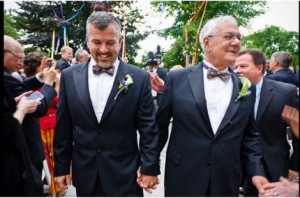By Cliff Dunn
TALLAHASSEE – Last week, the Florida Supreme Court heard oral arguments in a child-custody case between two women who are former partners in a committed same-sex couple. The case reflects the disparity between what Florida law defines as family units, and the reality as it exists down the length of the Sunshine State.
The case concerns two women contesting parental rights to their daughter, who was conceived in 2006 by having one of the women’s eggs implanted in the womb of the other (meaning that the girl has one birth mother, but a different biological mother). After the women split in 2006, the birth mother cut off all contact with her former partner, and took the child to Australia.
In most circumstances, both state and federal law recognize parental rights in the case of a biological mother who is raising her own child. But during the original custody suit, the Brevard County trial judge said that, because egg and sperm donors relinquish their parental rights, and because Florida law defines a “couple” as “one man and one woman” he was required to classify the biological mother as an “egg donor.”
For the protection and privacy of the child, the women are identified in court records by their initials. After his ruling, the judge told the biological mother, who is identified as TMH, “If you appeal this, I hope I’m wrong.” The 5th District Court of Appeal in Daytona Beach ruled in favor of the biological mother, saying that both women have parental rights.
Experts say that at the heart of the case is a 1993 state law regulating sperm and egg donation, as well as the rights of gay people to raise children and claim equal protection under the law. (In 2010, another appeals court ruled that Florida’s ban on gay adoption was unconstitutional.)
The 5th District’s ruling led to the appeal of the birth mother—who is identified as DMT—which was heard on October 2. Her attorney, Michael B. Jones, cited the precedence of other courts recognizing a birth parent’s privileged status. “A step-parent, a grandparent, under many different kinds of circumstances, may have a relationship with the child, but when the actual parent decides that that relationship is no longer appropriate for the child, then that is terminated,” Jones said.
Justice Barbara Pariente asked Jones why the biological mother isn’t an actual parent, when a man who fathers a child out of wedlock is recognized as such if he helps to raise the child. “Is that not a situation that at least implicates equal protection of women, at least to have equal protection as men?” asked Pariente, a West Palm Beach Democrat.
Chief Justice Ricky Polston noted the definition of a “couple” under state law, and asked whether the panel could even consider such questions. “It seems like you’re asking this court to implement social policy that’s not reflected in the Florida statutes, not in the Florida Constitution or, to me, in the U.S. Constitution. But you’re asking us to make a constitutional ruling on social policy,” said Polston (who was appointed to the Florida Supreme Court in 2008 by then-Gov. Charlie Crist) to the biological mother’s attorney, Robert Segal.
Segal, said, “We’re asking the court to make a determination that appellee [the biological mother] has protected parental rights, based on the actions of the parties.” He said the biological mother wasn’t just an egg donor, that she had taken equal part in the raising of the child until she was taken away by the birth mother. Because Florida law banned gay adoption at the time of the child’s birth, the woman didn’t have the option to adopt her child. As noted above, that ban was declared unconstitutional in 2010.
The justices raised the possibility of returning the case to the original trial judge to decide upon a doctor’s informed consent form signed by the biological mother, in which she gives up all rights to the donated egg, as well as any resulting offspring.
The birth mother’s attorney argued that the case hinges upon the consent form. The biological mother’s lawyer countered that the form is not a legal contract (it wasn’t signed by both parties), and applies strictly to anonymous sperm and egg donors, not a committed couple who plan to raise children together.











